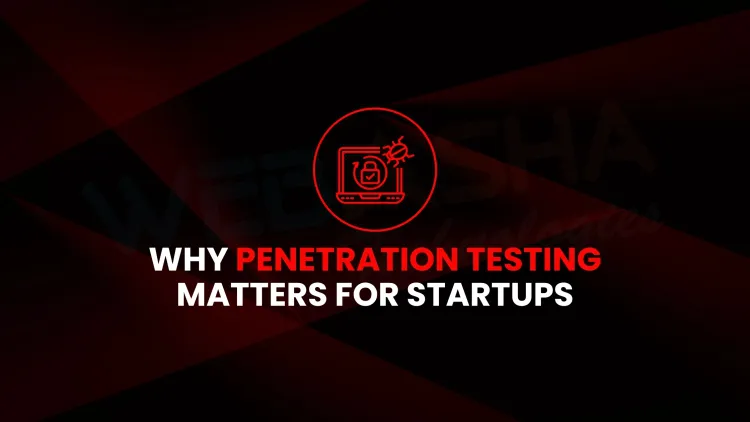What is the importance of penetration testing for startups in 2025?
Penetration testing (pen testing) is crucial for startups in 2025 because it helps detect and fix security vulnerabilities before attackers exploit them. As startups handle customer data, integrate third-party services, and scale rapidly, they become attractive targets for cyber threats. Pen testing provides early-stage security assurance, improves investor and customer trust, and ensures compliance with regulations like GDPR or HIPAA. By conducting regular pen tests, startups can reduce the risk of data breaches, secure their MVPs, and show security maturity in a competitive landscape.

Table of Contents
- What Is Penetration Testing?
- Why Startups Need Pen Testing Early On
- Common Startup Vulnerabilities Identified in Pen Tests
- How Often Should Startups Conduct Pen Tests?
- What Does a Pen Test Involve for Startups?
- Pen Testing as a Competitive Advantage
- Affordable Options for Startups
- Conclusion
- Frequently Asked Questions (FAQs)
In the fast-moving world of startups, innovation and speed are everything. But as young businesses race to launch new products and scale quickly, one critical area often gets overlooked — cybersecurity. Penetration testing (or pen testing) plays a crucial role in helping startups identify security vulnerabilities before attackers do. In this blog, we’ll explore why pen testing matters for startups, how it works, and the long-term value it provides even during early-stage growth.
What Is Penetration Testing?
Penetration testing is a simulated cyberattack carried out by ethical hackers (also known as penetration testers). These professionals try to find weaknesses in your systems — just like real attackers would — and report them before damage occurs.
It’s not just about running automated scans. A proper pen test includes manual techniques to uncover deeper flaws that tools may miss. It covers web applications, APIs, cloud configurations, networks, internal systems, and even employee behavior through social engineering.
Why Startups Need Pen Testing Early On
1. Startups Are Prime Targets
Startups often think they're too small to be targeted — but attackers see them as easy victims. Limited budgets, new technology stacks, and underdeveloped security controls make startups attractive to cybercriminals.
2. Investor and Customer Trust
When you raise funding or deal with enterprise customers, you're often required to prove your product is secure. A pen test report shows that you've taken cybersecurity seriously, which builds trust with investors and clients.
3. Compliance Requirements
Industries like fintech, healthtech, or SaaS often need to meet regulations such as GDPR, HIPAA, or ISO 27001. Pen testing is a standard requirement in many of these compliance frameworks.
4. Prevent Costly Breaches
A data breach can be catastrophic for a startup. The costs include legal fees, fines, downtime, customer loss, and damaged reputation. Pen testing is a proactive investment to prevent this.
5. Secure Your MVP and Beyond
Startups often release a Minimum Viable Product (MVP) quickly. But even your first release should be secure. Pen testing helps make sure you’re not launching with major vulnerabilities.
Common Startup Vulnerabilities Identified in Pen Tests
| Vulnerability Type | Description |
|---|---|
| Insecure APIs | Exposed endpoints without proper authentication or input validation |
| Misconfigured Cloud Storage | Public S3 buckets or exposed credentials in repositories |
| Weak Authentication | Default credentials, no MFA, or poor session management |
| SQL Injection & XSS | Application input not sanitized properly, allowing attackers to inject code |
| Insecure DevOps Pipelines | Leaky CI/CD pipelines exposing code or access keys |
| Over-permissioned Accounts | Users with more access than necessary |
How Often Should Startups Conduct Pen Tests?
-
Before launching a product or major update
-
After integrating third-party tools or APIs
-
Annually, or bi-annually for fast-moving startups
-
Before funding rounds to show security maturity
What Does a Pen Test Involve for Startups?
-
Scoping – Define what needs to be tested (app, network, cloud, etc.).
-
Reconnaissance – Gather information on your assets.
-
Exploitation – Try to break into the systems ethically.
-
Post-exploitation – Assess what attackers could do after gaining access.
-
Reporting – Deliver a detailed report with vulnerabilities, severity, and fixes.
Pen Testing as a Competitive Advantage
In a world where data leaks make headlines daily, showing that your startup proactively tests for security issues can set you apart. It shows maturity, builds user trust, and prepares you for enterprise-level partnerships.
Affordable Options for Startups
Startups don’t always need to spend big on security. Many cybersecurity companies offer tailored packages or even Startup Pen Test Programs. Look for providers that understand agile development and startup-specific risks.
Conclusion: Secure Your Growth from Day One
Penetration testing isn’t just for large enterprises. Startups face real threats, and a single breach can stop growth in its tracks. Pen testing helps you launch securely, scale confidently, and build the trust that turns early adopters into loyal users. The earlier you embed security into your roadmap, the stronger your startup becomes.
FAQs
What is penetration testing in cybersecurity?
Penetration testing is a simulated cyberattack performed by ethical hackers to find security weaknesses in a system before real attackers do. It helps organizations identify and fix vulnerabilities in applications, networks, and cloud infrastructure.
Why do startups need penetration testing?
Startups are often more vulnerable to attacks due to limited security resources. Pen testing helps them detect weaknesses early, build trust with investors and users, and prevent costly data breaches.
When should a startup conduct a pen test?
Startups should conduct a pen test before launching a product, after major updates, when integrating third-party services, and at least once a year to stay secure.
Is penetration testing expensive for startups?
Many cybersecurity firms offer affordable pen testing packages tailored for startups, especially those in early growth stages or preparing for funding rounds.
How does pen testing help with compliance?
Penetration testing is often required for compliance with frameworks like GDPR, HIPAA, SOC 2, and ISO 27001, making it essential for startups in regulated industries.
Can pen testing prevent ransomware attacks?
While pen testing doesn't stop ransomware directly, it helps identify weak points that could be exploited by attackers, including the ones used to deploy ransomware.
What are the top risks found in startup pen tests?
Common risks include insecure APIs, cloud misconfigurations, weak authentication, SQL injection, exposed credentials, and over-permissioned user accounts.
How long does a penetration test take for a startup?
Depending on the scope, a pen test for a startup can take anywhere from a few days to two weeks, followed by a detailed report with recommendations.
What is the difference between a vulnerability scan and pen testing?
A vulnerability scan is automated and identifies known issues, while penetration testing involves manual exploitation to simulate real-world attacks.
Is pen testing mandatory for startups?
It’s not legally mandatory for all startups, but it is often required by enterprise customers, investors, and compliance bodies.
What does a pen test report include?
A pen test report includes a summary of vulnerabilities found, risk ratings, evidence of exploitation, and detailed remediation steps.
Who performs penetration tests for startups?
Certified ethical hackers or cybersecurity firms with experience in startup ecosystems typically conduct penetration tests.
How does pen testing support investor confidence?
A startup that invests in cybersecurity shows maturity and responsibility. A clean pen test report can reassure investors about data protection and risk management.
Can pen testing be automated?
Some parts of the process are automated, but manual testing is crucial to find logic flaws, privilege escalation, and complex vulnerabilities.
What types of penetration tests are available?
Types include web application testing, API testing, network testing, cloud security testing, wireless testing, and social engineering.
Do startups need internal or external penetration tests?
Most startups benefit from both. External tests focus on internet-facing assets, while internal tests simulate insider threats or compromised access.
How do startups prepare for a pen test?
They define the scope, ensure test environments are ready, provide documentation, and assign contacts for coordination with the pen testing team.
Can pen testing be done during development?
Yes, especially in agile environments. Continuous or periodic pen testing during development helps catch issues early.
What is gray-box penetration testing?
Gray-box testing is where the tester has limited knowledge of the system, simulating an attacker with partial insider access — often ideal for startups.
How does pen testing protect customer data?
By finding and fixing vulnerabilities in systems that store or process user data, pen testing helps startups prevent unauthorized access and data leaks.
Can pen testing help with product security?
Yes, pen testing ensures that the product — especially SaaS or mobile apps — is secure before reaching users, improving overall product quality.
Is bug bounty the same as pen testing?
No. Bug bounties are open programs where anyone can find bugs, while pen testing is a controlled, professional security assessment.
How do I choose a pen testing provider for my startup?
Look for providers with experience in startup tech stacks, certifications (like OSCP or CEH), good references, and flexible pricing models.
Do pen tests affect live users?
Pen tests are typically done in staging environments or with prior planning to avoid impacting live users or services.
What happens after a pen test?
You’ll receive a report outlining issues found, severity levels, and how to fix them. Follow-up tests may confirm the effectiveness of fixes.
Can pen testing identify phishing risks?
Yes, some pen tests include social engineering attacks like phishing simulations to assess employee awareness and resilience.
Should I retest after fixing issues?
Yes, retesting ensures that vulnerabilities have been properly fixed and no new risks were introduced in the process.
What tools are used in penetration testing?
Common tools include Burp Suite, Nmap, Metasploit, Wireshark, Nessus, and custom scripts based on the target environment.
What is the ROI of pen testing for startups?
Preventing just one breach through pen testing can save a startup millions in losses, downtime, legal issues, and reputational damage.
Does pen testing help with SaaS security?
Absolutely. SaaS startups must secure web apps, APIs, databases, and customer data — all areas tested during a pen test.
Can pen testing help during acquisition or IPO?
Yes, security assessments including pen tests are often required during mergers, acquisitions, or IPO readiness to reduce risk and ensure compliance.














![Top 10 Ethical Hackers in the World [2025]](https://www.webasha.com/blog/uploads/images/202408/image_100x75_66c2f983c207b.webp)








